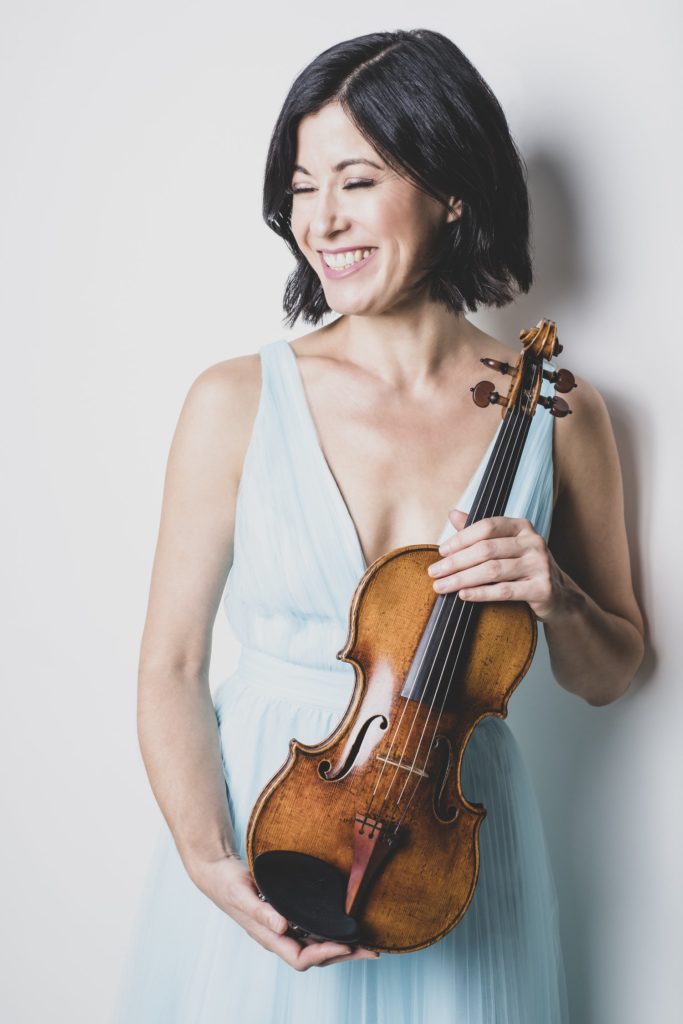Violinist Frautschi soars, lifting New World’s mixed chamber opener

Jennifer Frautschi performed Ralph Vaughan Williams’ The Lark Ascending with members of the New World Symphony Sunday afternoon.
A lark rose and produced silvery chains of sound.
The ravishing tone of Jennifer Frautschi’s violin brought Ralph Vaughan Williams’ portrait of The Lark Ascending to vivid life, providing the high point of the New World Symphony’s first chamber music concert of the 2022-23 season Sunday afternoon at New World Center.
Vaughan Williams was one of England’s greatest composers and his wide-ranging scores are played far too infrequently on this side of the pond. Frautschi displayed a deep sense of the vignette’s pastorale essence. Splendidly encompassing the work’s blend of British folk and romantic influences, she phrased with dark sonority and nobility of line. A seventeen-member ensemble provided stellar support.
Frautschi’s incisive articulation and strong leadership also played a dominant role in an energetic performance of the String Quartet No. 1 (“Calvary”) by Coleridge Taylor Perkinson (1932-2004). As composer, arranger and conductor, Perkinson traversed both the classical and popular musical spheres. His compact three-movement quartet inventively utilizes the melody of the spiritual “Cavalry” in a hybrid combination of theme and variations and fragmentary reference.
Perkinson’s 15-minute score mixes an updating of Dvořák’s American Quartet with indigenous influences in the Copland manner to winning effect. Camila Berg brought tonal luminance to the viola solo in the classical blues of the second movement. Frautschi dazzled in the astringent paragraphs of the final Rondo, agile and secure in the instrument’s top range. Violinist James Zabawa-Martinez and cellist Emily Yoshimoto ably contributed to a finely blended ensemble.
Mendelssohn’s Trio No. 2 in C minor fared less well. Noah Sonderling’s piano overpowered violinist Carson Marshall and cellist Victor Huls in the opening movement. The Scherzo, tossed off with aplomb and accuracy, offered the performance’s best moments. Huls displayed skilled chamber instincts when he was audible over Sonderling’s onslaught. Marshall’s sound emerged light and, at times, wiry. The Lutheran chorale “Praise to You. Jesus Christ” was shaped with eloquence in the final Allegro appassionato but too much of the players’ traversal sounded like a read-through.
Kevin Day’s Ignition for Low Brass Quartet was the concert’s high-energy opener. Jazzy and martial, the score was given exuberant advocacy with tuba player Andrew Abel a standout. Day actually managed to write a melodic line for that lowest of brass instruments and Day tossed it off with verve.
The outlier on the generous program was the Divertimento for Wind Quintet by Hans Eisler (1898-1962). A pupil of Schoenberg, Eisler embraced atonality in this 1923 opus which seemed twice as long as its seven minute time span. There is no charm or airiness in Eisler’s divertimento, only piercing vibrations. Some composers wrote beautiful atonal and serialist music. Eisler was not one of them.
Emily Bieker, flute, Mark Debski, oboe, Benjamin Cruz, clarinet, Eleni Katz, bassoon and Henry Bond, horn assayed a skilled, enthusiastic account of the quintet, making the music sound better than it is.
Christoph Koncz conducts the New World Symphony’s season-opening concert, which includes Strauss’s Till Eulenspiegel’s Merry Pranks, Stephen Koncz’s Fanfare for Uhrovec, Brahms’ Symphony No. 3 and excerpts from Weber’s Der Freischütz with soprano Jeanine De Bique. Concert time is 7:30 p.m. Saturday and 2 p.m. Sunday at the New World Center in Miami Beach. nws.edu
Posted in Performances
Leave a Comment
Mon Oct 10, 2022
at 12:39 pm
No Comments